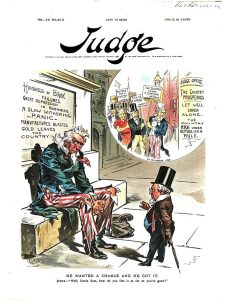Week 24
 The Panic of 1893 was an economic depression in the United States. It began in February 1893 and officially ended eight months later, but the effects from it continued to be felt until 1897. It was the most serious economic depression in history until the Great Depression of the 1930s. The Panic of 1893 deeply affected every sector of the economy and produced political upheaval that led to the political realignment and the presidency of William McKinley. The Panic of 1893 has been traced to many causes, one of them pointing to Argentina; investment was encouraged by the Argentine agent bank, Baring Brothers. However, the 1890 wheat crop failure and a failed coup in Buenos Aires ended further investments. In addition, speculations in South African and Australian properties also collapsed. Because European investors were concerned that these problems might spread, they started a run on gold in the U.S. Treasury. Specie was considered more valuable than paper money; when people were uncertain about the future, they hoarded specie and rejected paper notes. During the Gilded Age of the 1870s and 1880s, the United States had experienced economic growth and expansion, but much of this expansion depended on high international commodity prices. Exacerbating the problems with international investments, wheat prices crashed in 1893. In particular, the opening of numerous mines in the western United States led to an oversupply of silver, leading to significant debate as to how much of the silver should be coined into money. During the 1880s, American railroads experienced what might today be called a "bubble": investors flocked to railroads, and they were greatly over-built. One of the first clear signs of trouble came on 20 February 1893, twelve days before the inauguration of U.S. President Grover Cleveland, with the appointment of receivers for the Philadelphia and Reading Railroad, which had greatly overextended itself. Upon taking office, Cleveland dealt directly with the Treasury crisis and convinced Congress to repeal the Sherman Silver Purchase Act, which he felt was mainly responsible for the economic crisis. As concern for the state of the economy deepened, people rushed to withdraw their money from banks, and caused bank runs. The credit crunch rippled through the economy. A financial panic in London combined with a drop in continental European trade caused foreign investors to sell American stocks to obtain American funds backed by gold. (Wikipedia)
The Panic of 1893 was an economic depression in the United States. It began in February 1893 and officially ended eight months later, but the effects from it continued to be felt until 1897. It was the most serious economic depression in history until the Great Depression of the 1930s. The Panic of 1893 deeply affected every sector of the economy and produced political upheaval that led to the political realignment and the presidency of William McKinley. The Panic of 1893 has been traced to many causes, one of them pointing to Argentina; investment was encouraged by the Argentine agent bank, Baring Brothers. However, the 1890 wheat crop failure and a failed coup in Buenos Aires ended further investments. In addition, speculations in South African and Australian properties also collapsed. Because European investors were concerned that these problems might spread, they started a run on gold in the U.S. Treasury. Specie was considered more valuable than paper money; when people were uncertain about the future, they hoarded specie and rejected paper notes. During the Gilded Age of the 1870s and 1880s, the United States had experienced economic growth and expansion, but much of this expansion depended on high international commodity prices. Exacerbating the problems with international investments, wheat prices crashed in 1893. In particular, the opening of numerous mines in the western United States led to an oversupply of silver, leading to significant debate as to how much of the silver should be coined into money. During the 1880s, American railroads experienced what might today be called a "bubble": investors flocked to railroads, and they were greatly over-built. One of the first clear signs of trouble came on 20 February 1893, twelve days before the inauguration of U.S. President Grover Cleveland, with the appointment of receivers for the Philadelphia and Reading Railroad, which had greatly overextended itself. Upon taking office, Cleveland dealt directly with the Treasury crisis and convinced Congress to repeal the Sherman Silver Purchase Act, which he felt was mainly responsible for the economic crisis. As concern for the state of the economy deepened, people rushed to withdraw their money from banks, and caused bank runs. The credit crunch rippled through the economy. A financial panic in London combined with a drop in continental European trade caused foreign investors to sell American stocks to obtain American funds backed by gold. (Wikipedia)
The pro-Republican party cartoon above suggests that the Panic was the fault of the newly elected Democrats.
Caption:He wanted a change and he got it.
Judge standing in front of Uncle Sam asks him, "Well, Uncle Sam, how do you like it as far as you've gone?"
REQUIRED READING
See Chapter 12: "A Nation Transformed"
